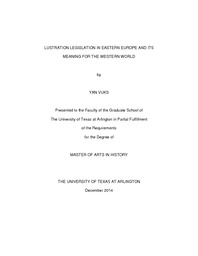
ATTENTION: The works hosted here are being migrated to a new repository that will consolidate resources, improve discoverability, and better show UTA's research impact on the global community. We will update authors as the migration progresses. Please see MavMatrix for more information.
Show simple item record
| dc.contributor.author | Vuks, Yan Valerievich | en_US |
| dc.date.accessioned | 2015-07-01T17:50:26Z | |
| dc.date.available | 2015-07-01T17:50:26Z | |
| dc.date.issued | 2014-12 | |
| dc.date.submitted | January 2014 | en_US |
| dc.identifier.other | DISS-12899 | en_US |
| dc.identifier.uri | http://hdl.handle.net/10106/24931 | |
| dc.description.abstract | Lustration policies spread widely across Eastern Europe in the early 1990's after the fall of the Communism when most of the post-Communist states of Eastern Europe employed a strategy of purging the former Communists from the state apparatus with the help of `lustration' laws. The countries of Eastern Europe developed different approaches to lustration, and the practices adopted by Germany, Czechoslovakia and Estonia demonstrated a great degree of variety. The great influence of the lustration policy on societies of the Eastern European countries makes it necessary to rethink the very concept of lustration. The important issue of self-lustration expands the lustration practice beyond the legal sphere. Lustration should be seen not as set of legal rules, but as a mixture of legal policies adopted by the legislative bodies, and of informal practices, which were usually carried out by the population. This perception of lustration adds another dimension to lustration and expands the object of study beyond the legislation of the country.The adoption of formal lustration practices assumed a particular viewpoint about the nature of a dictatorial regime, shared by many Western media and senior officials. This viewpoint is based on the premise that an individual or a small group of individuals can seize all power and cut off the rest of the population from all participation in state politics. However, studies of denunciation letters demonstrate that a population often accepts and voluntarily collaborates in the practices of a dictatorial regime. The existence of the denunciation culture has multiple examples in Modern European history such as in Stalinist Russia or in Nazi Germany. Denunciation studies are important for redefining the concept of dictatorship. These studies show that the popular concept of dictatorship as a state of people oppressed by a ruthless dictator, aided by a small group of his followers, is erroneous. In light of those findings a more sophisticated view of dictatorship emerges, one that sees it as a precariously balanced system of relationships between contentious socio-economic or ethnic groups. | en_US |
| dc.description.sponsorship | Adam, Thomas | en_US |
| dc.language.iso | en | en_US |
| dc.publisher | History | en_US |
| dc.title | Lustration Legislation In Eastern Europe And Its Meaning For The Western World | en_US |
| dc.type | M.A. | en_US |
| dc.contributor.committeeChair | Adam, Thomas | en_US |
| dc.degree.department | History | en_US |
| dc.degree.discipline | History | en_US |
| dc.degree.grantor | University of Texas at Arlington | en_US |
| dc.degree.level | masters | en_US |
| dc.degree.name | M.A. | en_US |
Files in this item
- Name:
- Vuks_uta_2502M_12899.pdf
- Size:
- 567.6Kb
- Format:
- PDF
This item appears in the following Collection(s)
Show simple item record


